What is Fuchsia, and why should you care?
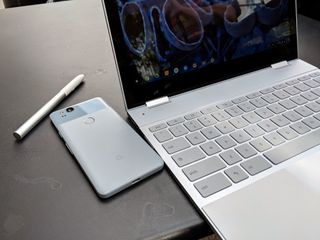
A long time ago, in 2016, the internet learned about a supposed Google initiative to merge Chrome OS and Android. It was to have the codename Andromeda and would unify all of Google's computing platforms so that they all used the same operating system. It made sense in many ways; it is similar to what Microsoft is doing with mobile, tablet and desktop software and supposedly the direction Apple is moving with iOS and macOS. Codenames and rumors aside, what ended up happening was the ability to visit the Google Play Store with a Chromebook and run Android apps natively.
This was a big deal, and if it was what Andromeda turned out to be it was certainly enough. Everyone benefits from having Android apps available on Chromebooks — Google can sell more and we can use them better because there will be an "app for that" whenever we need one. But the idea of Android and Chrome merging never really went away. It just got a new codename: Fuchsia.
More: These are the Chromebooks that can run Android and Linux apps
Fuchsia got its name, according to some of the developers, from existing projects.
Pink + Purple = Fuchsia (a new Operating System)
Project Pink was an original idea from Apple's engineering team when they decided it was time to build a new object-oriented operating system with a new user interface, and the notes were written on pink index cards. Project Purple was the original name given to prototype production of a touchscreen phone from Apple; the iPhone. The original developers of Fuchsia are well-versed with this history, as they were also part of former projects like BeOS, iOS, and WebOS.
But an operating system needs more than a name. And without Google telling us anything about its new project, we're left to piece together all the breadcrumbs the internet can find. Here is what we know so far.
Fuchsia is not going to replace Android or Chrome OS
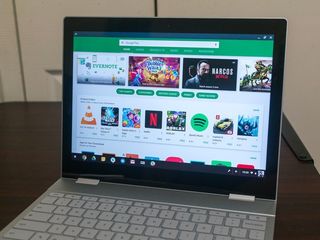
Android is a complicated thing. It can be thought of as a complete operating system that you would find on a smartphone or tablet, or it can be a small part of an operating system that is built to run applications as we saw from BlackBerry on OS 10 devices. Most of all, Android is familiar to about two billion people and has a huge ecosystem of software, devices, accessories and support staff. You never abandon something this successful — you build on it instead.
Be an expert in 5 minutes
Get the latest news from Android Central, your trusted companion in the world of Android
Google learned the benefit of using their own software from Oracle in the courtroom.
Fuchsia will probably replace the part of the software you don't see; the part that makes the hardware run and lets you tell your phone to do something when you tap the screen or talk into the microphone.
Right now Android uses the Linux kernel and a handful of utility programs written to work with Linux. Linux is great in many ways. It's built to work with almost anything hardware-wise, has a huge community that contributes and makes every version better than the last one, and will be around a lot longer than any hardware you buy today that uses it. Chrome is mostly the same way. Its's a bunch of user-facing services and utilities that run atop the Linux kernel. So is Android Auto, and Android TV, and Wear OS.
But Linux doesn't "belong" to Google and it wasn't designed specifically for mobile hardware. These are two things Google wants and eventually will need in order to continue to compete.
Fuchsia will be built for 2019 and beyond, not for the legacy of the past.
Google needs a mobile operating system built from the ground up at every level designed for 2018. It has to be lean and easy on resources, be able to compute quickly without taxing the chips inside our phones, and it has to be able to instantly respond to all the ways we can "talk" to it like touch, mouse and keyboard, or voice. And it has to do all of this while still being the same user-friendly Android we already know and still run the millions of applications written for Android.
In short, Fuchsia is replacing Linux and parts of Android (and probably Chrome, Android TV, Android Auto, etc.) with something that works better for Google's purposes. The user interface — what you and I see on our phones or Chromebooks or watches — has nothing to do with this part of the operating system. Besides, Fuchsia is too hard to spell.
Benefits of the change
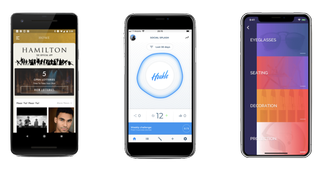
As mentioned, Google wants software they have more control over and that was designed to be lean and fast on the relatively low-end hardware we see in mobile products. But there are two other very important benefits from moving to a custom operating system, and this time we do get to see them.
Developers will be able to use more current programming languages to write applications. We're already seeing this with programming tools like Dart and Flutter making their way to Android, and any new OS is certainly being written with modern programming tools in mind.
Sometimes you need a sledgehammer. Other times you need something more delicate.
There is nothing wrong with programming in C or Java. Both languages are very robust and can make any hardware do anything. But that also means they are designed to do a lot of things a mobile app developer doesn't need, and this can make them a little cumbersome to learn and use. An Android app developer doesn't need his code to communicate directly with the CPU using machine code. But an app developer does need access to easier and more efficient ways to have smooth UI transitions or scalability for different screens. C++ is great for powering a robot, but Flutter is great for building a great app interface. Letting developers leverage tools that help make better apps means we get better apps.
These new tools combined with a unified bottom layer of software across all devices means one app can work everywhere. That's great, but Android already lets one app work everywhere, and to be frank, that means apps mostly suck on any device except a phone. Different size screens need different user interfaces, and most developers only code for a phone-sized one because it's not easy to make an app look great everywhere.
Better developer tools mean better apps on every screen.
That will change with tools like Flutter and that's our second benefit. Right now it's difficult to build an Android app that works on a small 5-inch display but transforms to take advantage of a 12-inch display. It can be done beautifully — see the Gmail app for an example — but the work involved usually puts developers off the idea. If the tools would let a developer define a few different ways to use the full display to give us the right amount of information with just a few steps, most developers would do so.
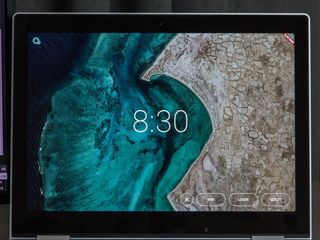
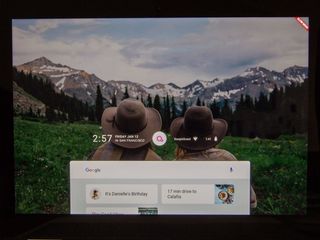
Fuchsia demo installed on the Google Pixelbook.
This is what Fuchsia looks like on the Pixelbook. Developers can easily define what goes into the smaller content fields, what is used as a pleasant background, how things are laid out and how much content we need to see with just a few steps. Right now there are only examples and demos, but those give us an excellent idea of what to expect. Compare it to Fuchsia on a phone-sized display below.
Notice the similarities, then notice the differences. This is how one piece of software, in this case, a simple user interface or "home" app, can be changed to perform on two different size displays. This is what Android in its current state is lacking. This is what we need to happen. This is why Google — and we — want Fuchsia to become a real thing.
Nothing is final, everything can change
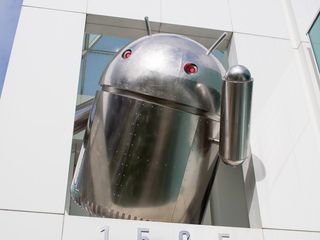
As mentioned at the top of this article, we've built this on a mixture of rumors, source code uploads, tidbits of insider information, and a dash of imagination. Google has said nothing about any future where Fuchsia is a reality.
That's important because this is a HUGE undertaking. It's even bigger than creating Android in the first place was because much of it involves coding for the bottom layer instead of depending on existing software. Android was built atop Linux, iOS was built atop BSD, Fuchsia is being built from the ground up. It will take a few years until we could see a consumer version or even a version for the public to test that's not just a proof of concept demo. This is hard work that will take thousands of hours to finish.
I believe that Google does have plans for Fuchsia and it's not just a pet project of some talented developers or something Google will start and never finish. I'm paying close attention to all of this, not just because it's how we make our living, but because we're both interested and amazed at what might develop from the project. We'll continue to revisit this space and add information as it becomes available, but for now, there is mostly educated guessing and plenty of wishing involved.
Top 3 ways Fuchsia can be a better operating system than Android

Jerry is an amateur woodworker and struggling shade tree mechanic. There's nothing he can't take apart, but many things he can't reassemble. You'll find him writing and speaking his loud opinion on Android Central and occasionally on Twitter.
